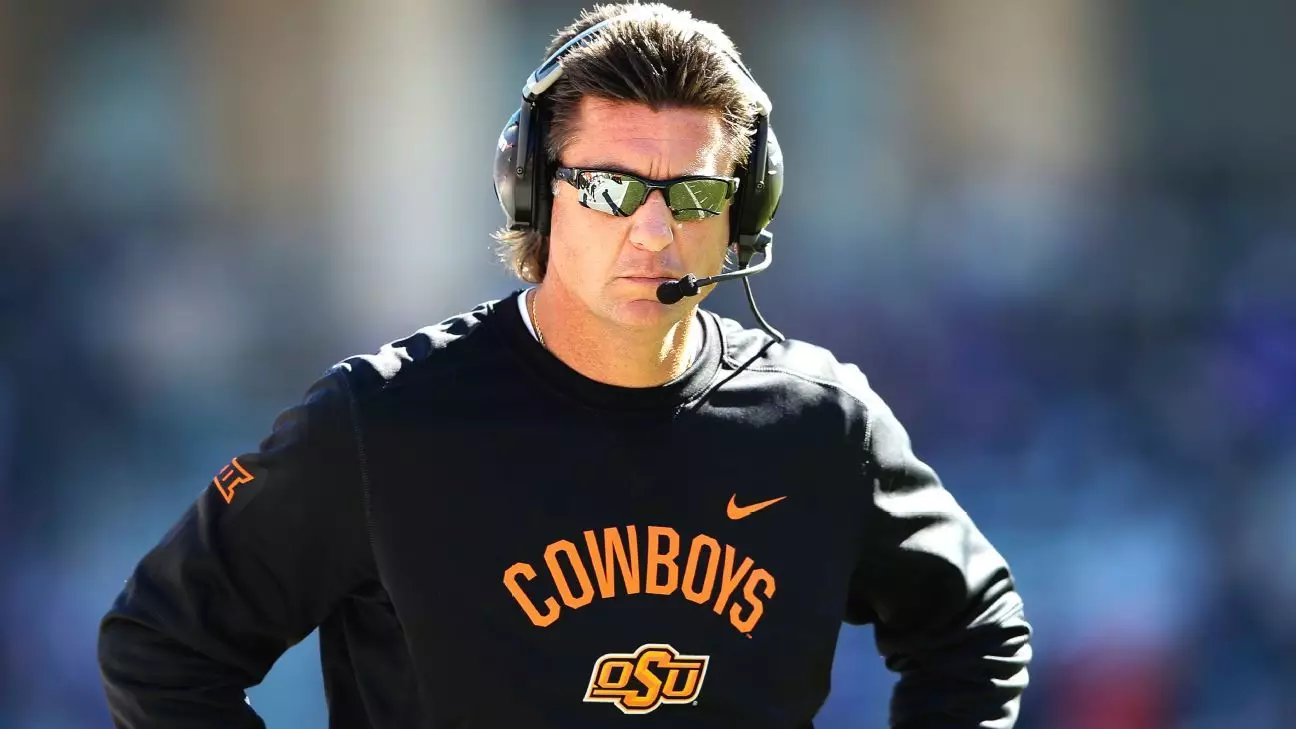Oklahoma State University has reaffirmed its commitment to football head coach Mike Gundy by finalizing a restructured contract. This move comes after intense discussions spearheaded by university officials, including the board of regents, who have sought a strategic path forward for the program. Sources convey that Gundy’s annual salary—originally at $7.75 million—will be adjusted and partially reallocated to enhance revenue sharing with players. Additionally, the buyout clause in his contract has been diminished, indicating a shift in how the university approaches financial commitments to coaching staff.
Despite the uncertainty that cloaked Gundy’s future during negotiations—sparked by a dismal 3-9 record this past season—his extensive tenure and achievements with the Cowboys were pivotal in the decision to retain him. Gundy stands as the most successful coach in Oklahoma State’s history, having secured a commendable 169 wins against only 88 losses since he took over in 2004. Such a legacy, particularly highlighted by the team’s impressive runs—including a Big 12 Championship in 2011 and multiple bowl game appearances—affords him a degree of stability, even in turbulent times.
Within the institutional framework, Gundy appears to have the backing of key figures like university president Kayse Shrum and athletic director Chad Weiberg. However, the board of regents is a diverse body; reports have indicated that at least one regent advocated for Gundy’s departure, illustrating the contrasting opinions among decision-makers. This dichotomy often exists in collegiate sports programs where financial pressures and performance expectations collide, leading to complex narratives surrounding leadership longevity.
Gundy’s decision to restructure his contract, including a willingness to relinquish part of his salary, speaks volumes about his dedication to the program’s revitalization. Yet, this willingness may not have been immediate; both sides experienced a period of contention regarding the specifics of the financial adjustments, leaving fans and stakeholders anxious about the coach’s prospects.
Historically, Gundy has maintained a robust track record—his teams have achieved significant rankings, with ten AP top-20 finishes that peaked at the No. 3 spot in 2011. Nevertheless, this recent season has marked a significant downturn in the program’s fortunes. The Cowboys concluded the season with a humiliating defeat against Colorado, ending not only with a disappointing win-loss record but also with the first taste of failure in numerous bowl appearances that had become a hallmark of Gundy’s tenure.
The implications of Gundy’s poorer performance extend beyond just game records. His coaching staff underwent scrutiny as well, leading to the dismissal of both the offensive and defensive coordinators shortly after the conclusion of the dismal season. This upheaval reflects a potential internal acknowledgment that changes at multiple levels within the coaching structure may be necessary to turn the program around.
Despite the challenges, Gundy’s long-standing affiliation with Oklahoma State—including his successful career as a star quarterback—serves as a foundation for hope. His past accolades, such as being named Big 12 Coach of the Year multiple times, bolster his credibility and his potential to right the ship.
The university faces a pivotal moment where it must balance fiscal responsibility with the quest for competitive excellence. As the football landscape continues to evolve—emphasized by the rising importance of player revenue sharing—the strategies adopted in Gundy’s restructured contract may serve as a template for how other programs navigate similar challenges.
Ultimately, the agreement not only sustains Gundy’s legacy but also opens a new chapter for Oklahoma State football. While expectations will undeniably rise, the school’s leadership, including Gundy, finds themselves at the forefront of redefining the narrative around a storied program in search of renewed success.

